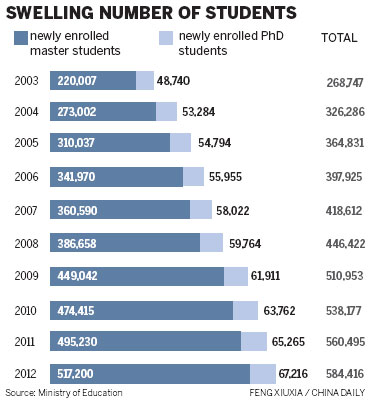Surge in postgrads puts pressure on advisers
Updated: 2012-10-23 07:36
By Luo Wangshu and Yang Yao (China Daily)
|
|||||||||
In the wake of studies showing the number of postgraduate students had doubled in the past decade, education insiders have raised concerns that supervisors are now under greater pressure.
Universities and higher institutions planned to recruit 584,000 postgrads in 2012, compared with 268,000 in 2003, according to the Ministry of Education.
Although the increase in educators has kept pace - ministry data for 2010 show there were 260,000 postgrad supervisors, compared with 128,000 in 2003 - insiders say they are now responsible for more students, which is affecting quality.
"In the past, one supervisor had one to two students. Now some young faculty members with energy have a dozen," said Zhu Xiaoman, a professor at Beijing Normal University's School of Education.
"Students used to follow their supervisors around to get more chances to have conversation. It was an immersed education environment, which is critical in a postgraduate education," she said, adding that nowadays, students are more like products off an assembly line.
The large number of graduate students requires more advisers, but some do not have solid credentials.
Zhu recalled that, in 1995, when she started to recruit PhD students, her school at the time - Nanjing Normal University - only had 17 professors with the credentials to recruit PhD students.
However, "one school now has a couple of hundred professors who are able to hire PhD students," she added.
Qiu Junping, director of the Research Center for Chinese Science Evaluation at Wuhan University, also raised concerns over standards due to the rocketing number of postgrad students.

"The major issue in postgrad education is to control the number of students and improve the quality," said Qiu, who recently led research on China's postgraduate education and evaluation.
At China's top 10 universities, including Tsinghua and Peking, students graduating from postgrad programs last year outnumbered those finishing undergraduate programs, he added.
Meanwhile, undergraduates and postgrads have both found China's job market tough going in recent years.
Le Meng, 24, who is doing a master's in marketing at Nanjing University, said she constantly questions whether she made the right choice staying in school.
"In retrospect, I would have better chances if I went to work or studied overseas," she said. "I need more practical chances than theories."
Contact the writers at luowangshu@chinadaily.com.cn and yangyao@chinadaily.com.cn

 Relief reaches isolated village
Relief reaches isolated village
 Rainfall poses new threats to quake-hit region
Rainfall poses new threats to quake-hit region
 Funerals begin for Boston bombing victims
Funerals begin for Boston bombing victims
 Quake takeaway from China's Air Force
Quake takeaway from China's Air Force
 Obama celebrates young inventors at science fair
Obama celebrates young inventors at science fair
 Earth Day marked around the world
Earth Day marked around the world
 Volunteer team helping students find sense of normalcy
Volunteer team helping students find sense of normalcy
 Ethnic groups quick to join rescue efforts
Ethnic groups quick to join rescue efforts
Most Viewed
Editor's Picks

|

|

|

|

|

|
Today's Top News
Health new priority for quake zone
Xi meets US top military officer
Japan's boats driven out of Diaoyu
China mulls online shopping legislation
Bird flu death toll rises to 22
Putin appoints new ambassador to China
Japanese ships blocked from Diaoyu Islands
Inspired by Guan, more Chinese pick up golf
US Weekly

|

|







